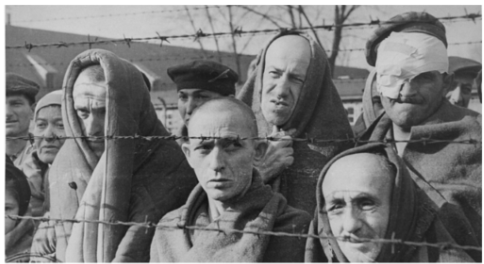Andrew Silow-Carroll
JTA, Apr. 16, 2023
“David never takes his good luck for granted — the film is organized around his suspicion that there is a missing piece to his story of survival and that, as Avi says, “He could not have done it alone.””
Holocaust documentaries tend to sit along a scale from horrific to heartwarming. For every “Night Will Fall,” the rediscovered British film showing gruesome scenes from newly liberated Nazi concentration camps, there is a family-friendly film about a survivor, like “The Number on Great-Grandpa’s Arm.”
Some critics distrust Holocaust documentaries that have “happy” endings, or that focus on the second chance given to survivors as if they betray the fate of the many more millions of Jews who died rather than survived. Raye Farr, the former director of the Steven Spielberg Film and Video Archive of the United States Holocaust Memorial Museum, once criticized Holocaust documentaries’ “increasing inclination to go for sentimentality.”
“How Saba Kept Singing,”a documentary airing on PBS on Tuesday in honor of Yom Hashoah, Holocaust Remembrance Day, is firmly on the side of uplift. It’s about Cantor David Wisnia, whose unlikely survival tale was told in a memorable New York Times article in 2019. The film’s redemptive message is clear from its first line — “I’m a lover of life,” says Wisnia — to one of its last: “You are really the proof that Hitler did not win,” he tells his grandson.
Wisnia was a Polish Jew who survived Auschwitz by literally singing for his captors. Defying the perverse and inexplicable odds of the Final Solution, the former cantorial prodigy managed to live close to three years at the death camp and slave labor complex.
Perhaps as remarkable was his relationship with a fellow inmate, Helen “Tzippi” Spitzer, a similarly “privileged” prisoner who managed to stay in the Nazis’ good graces thanks to her skills as a graphic artist. Her assignments took her to places beyond the women’s barracks, where she met Wisnia, eight years her junior. Soon the two were arranging trysts in a loft where prisoners’ uniforms were stored. Fellow prisoners kept a helpful watch for guards.
Their death camp romance ended on the eve of liberation, when the Germans began emptying the camps and forced the prisoners on a series of death marches. Although David and Tzippi made plans to meet in Warsaw, life had other ideas. Wisnia eventually made it to America after the war, where he became a cantor at synagogues in Levittown, Pennsylvania, and Trenton, New Jersey. As for Tzippi, Wisnia wasn’t sure if she survived the war — and when he discovered the truth it set in motion the next remarkable chapter in their story. … [To read the full article, click here]


